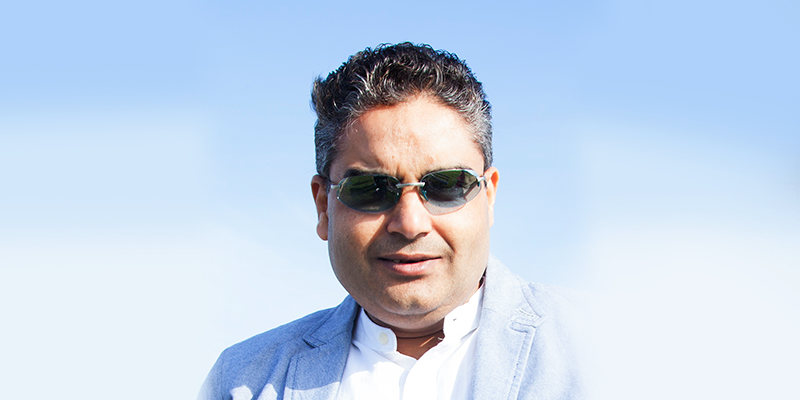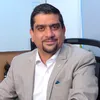This doctor’s healthtech startup aims to be a game-changer with its ‘hospital in a bag’
Delhi-based Agile Healthcare wants to resolve the problem of access to healthcare with the Medi Junction Hospital in a Bag, which uses telemedicine to provide comprehensive primary and preventive services.
The Supreme Court has ruled healthcare a fundamental right, the Indian government has rolled out the biggest publicly funded healthcare plan in the world, and global investments are pouring into tertiary care, but the country's healthcare needs remain acutely underserved.
India spends not more than 1.3 percent of its GDP on health, and many rural and semi-urban areas don’t have access to basic healthcare. There is only one primary healthcare centre, often staffed with one doctor, for more than 51,000 people.
Keen to resolve the problem of access to healthcare, Dr Vishal Upadhyay launched Delhi-based healthtech startup Agile Healthcare, which claims to have put a “hospital in a bag”.

Vishal realised that technology could help access doctors remotely, and “so we came up a portable solution: the Medi Junction Hospital in a Bag”.
Agile Healthcare aims to transform the industry by using the latest technologies to provide healthcare services in remote areas where specialist doctors cannot be stationed.
The healthtech startup provides comprehensive primary and preventive healthcare through telemedicine at patients’ doorsteps through Medi Junction E-Clinics.
Agile Healthcare at present runs 10 such e-clinics in Bihar; five more will start operations soon in NCR.
The beginning
Dr Vishal Upadhyay is an orthopaedic surgeon who trained in India and the UK. After studying at Royal College of Surgeons in England, Vishal continued his practice in the UK for 16 years. But the hankering to make a difference at home didn’t leave him.
He returned to India in 2019 with one aim: providing effective medical care, especially in rural India. He started creating the bag in 2017, and rolled out the product last year.
“Technology was transforming healthcare in the UK, and I had gathered significant experience and insight to combine medical expertise and technology for an India-specific solution,” he says.
Vishal says he was in the UK when he conceived the idea of a portable hospital kit, but was unsure of how to build it.
“A major challenge was the integration of technology with medical solutions. So, we identified the right devices, equipment, and other items the kit needed. We had to keep the equipment size as small as possible to address the portability challenges,” he says.
It took him over a year to design the full-fledged “hospital in a bag”.
How does it work?
For primary healthcare services, diagnosis, and treatment, a patient needs to visit the nearest Medi Junction E-Clinic where a health officer assists them and connects them to a doctor over a video call.
The health officers are not doctors; they are trained by Agile Healthcare. They help patients with the consultation and medical examination via digitalisation along with blood tests with instant reports to facilitate diagnosis and further treatment/referrals, if needed.
The bag caters to five essential aspects: medical inspection (web camera), medical history taking (video conferencing with doctor), medical examination (through IoT devices), investigations and blood tests for diagnosis, and prescription and dispensing of medications.
“We conduct blood tests at the e-clinic with Point-of-Care Testing Devices (POCT). The patients are able to complete their entire outpatient journey, including examination, blood tests with reports, consultation with doctor, and dispensation of medicines, within half an hour,” the doctor says.
What is in the bag?
The Medi Junction hospital kit comprises more than 20 pieces of equipment, including a device to measure height, weight, BMI, body fat, muscle mass, and composition measure; infrared thermometer; blood pressure measure; SpO2 measure; 12-channel ECG; digital stethoscope; digital otoscope; pharyngoscope; nasoscope; digital dermatoscope; foetal Doppler; and digital spirometer to assess lung function.
It also has vision screening equipment to test colour and contrast vision for eyesight; refractometer to test vision and prescribe spectacles for people with refractive error, digital fundoscope; devices for blood tests; biochemistry analyser; and immunoassay analyser.
Agile Healthcare has been working on strategic alliances and has partnerships with various hospitals, doctors, pharmacies, individual investors, medical supply companies, and medical laboratories.
As of now, the healthtech startup has a team of 30 people, including doctors, health officers, technical specialists, and operations managers.
“We aim to help a patient get treatment for existing conditions, and prevent illness and complications with early intervention,” Vishal says.
Business model and growth
The “hospital in a bag” price ranges between Rs 1.5 lakh and Rs 12 lakh, as the kit has been designed and priced in a modular manner with add-on functionalities.
“We can provide, operate, and maintain digital dispensaries in various individualised models of ownership and operation.”
The startup also runs a “dispensaries model”: it sets up digital dispensaries for individual entrepreneurs, providing them training, and assisting them with funding, loans, and corporate/social/government engagement.
Can a solution like this make profits? Vishal believes it can.
A patient pays approximately Rs 250 for consultation and medicines. But Vishal says that even though Medi Junction E-Clinic has a low profit margin, the large volumes make up for it.
The revenue streams though not massive, are steady and “growing at an expected pace of 10 to 15 percent every month”, he says.
Vishal, however, did not share current turnover and the charges patients pay to access the clinics.
He reveals that he expects the company to become profitable by the end of FY20. “We are hoping to complete about 3.5 lakh consultations, and will reach out to more people in rural areas by the end of the current year.”
Funding and plans
Agile Healthcare wants to scale to at least 100 clinics in the next six months in states like Bihar, NCR, and Himachal Pradesh, which can take the company’s turnover to about Rs 25 crore.
Vishal says he has invested more than Rs 4 crore so far from his own savings as well as external funding. He is now looking for at least Rs 15 crore funding to achieve his target of reaching 100 centres.
The healthtech startup is also eyeing global expansion, and will begin with underdeveloped countries.
“Medi Junction can be a game-changer for providing healthcare to the masses, especially in areas where doctors are not available,” Vishal says.
(Edited by Teja Lele Desai)








1568117771453.png?fm=png&auto=format&h=100&w=100&crop=entropy&fit=crop)


![[Startup Bharat] Y Combinator-backed BeWell Digital is enabling the digital transformation of radiologists](https://images.yourstory.com/cs/2/40d66ae0f37111eb854989d40ab39087/ImagesFrames31-1648033042143.png)

